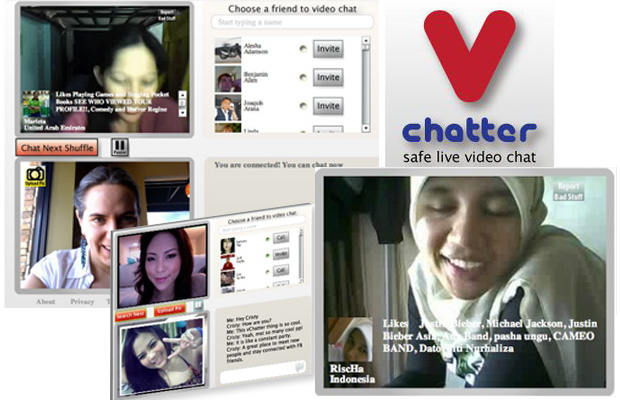Trump rescinds Biden executive order on artificial intelligence
The EO set AI safety and security standards and called for a report on AI's impact on labor
Read more...
Is Chatroulette too seamy for you? You don’t want to chat with a middle-aged man who lives alone and may or may not be a registered sex offender, you say? There is a new video-chat service where you can chat free from the fear of having a creepy stranger expose himself to you. VChatter is a Facebook application that offers a more family-friendly chatting environment, or so it claims.
One of the founders of vChatter inc. is Will Bunker, who also created an online dating site called One-and-Only.com back in 1996, which he later sold to Ticketmaster/CitySearch in 1999 for $45 million, at which the point the site was renamed Match.com. Bunker and co-founders Dan Owen and Hitesh Prashar
launched vChatter back in May, and it has since grown to over 3.6 million unique visitors.
Though vChatter doesn't come outright and say it's a dating service -- according to the company Web site, "vChatter is a forum where users “can meet new people and develop meaningful relationships" -- it's not a stretch to assume that landing a date is a big motivating factor for some users, especially for those who want to "discover" new friends.
VChatter vs Chatroulette?
How does it work? Internet users can access the chat application by going to vChatter.com, or clicking on the Facebook vChatter app. From there, you have the option of inviting a friend to jump into a video chat with you (à la Skype), or you can wait for a random chat partner to be found for you (this is clearly a dating feature). But vChatter can also be a useful way to stay in touch with family and friends on Facebook. Rather than invite them to a video chat on Skype, why not invite them to a video chat on Facebook?
What is the difference between vChatter and Chatroulette? With vChatter, users can only sign in through their Facebook handles so that their information is visible for potential chat partners. If you choose to chat with a random person, that individual’s profile will become visible so that by clicking on his or her profile picture, you can access that person’s information.
The chat service is heavily policed, and inappropriate behavior can be reported to the site by clicking the aptly named “Report Bad Stuff” button. Furthermore, users can only chat in established social networks where members post their profiles, so you know the name and location of every person you chat with… which sounds better in theory than in practice.
Some users have reported that there really is no difference between vChatter and Chatroulette, and that vChatter poses the same gross-out risks as Chatroulette. The only difference is that unlike Chatroulette, vChatter users are also putting all of their information out there on the table from the get-go, which actually poses a bigger risk than would a completely anonymous premise.
Co-founder Hitesh Parashar tells me that since the startup's "very early days," vChatter has been focused on making the service a safe environment. "This is a hard problem to solve and we use both tools and people to attack it," he said. Some of the ways that vChatter polices what goes in video chats, according to Parashar, are:
Will it evolve?
Of course, after the novelty wears off - and it always does - the big question is: Will video chatting really take off? Or will vChatter evolve into something else? There have been attempts to make video chatting commonplace in the past. And, they've not exactly worked out. Seesmic started out as a Twitter-like service, but in video. The idea was that people would share their idea on any topic. The goal was to be the "CNN of my friends," said Loic Le Meur the founder. Seesmic eventually moved away from video and is now an application to post text on Twitter. The problem? Not enough people wanted to do video chats.
Then there's Woome, a place where you can meet people online through video introductions. Based on its Web site, it still appears to be a destination for video introductions, but many of the profiles are very rich in text, and lack video. Additionally, at one point, Woome branched out with Woome TV, and its first celebrity was MTV's Tila Tequila whose show was called, "A shot at love with Tila Tequila." The show featured Tila randomly meeting guys on video.
Whatever may come of the vChatter service, for now it's growing.
According to AppData, daily active users went from 61,995 at the beginning of August to 149,090 users at the end of August. Monthly users nearly doubled to 2,128,574 from 1,357,095 between August and September. The vChatter app has become one of the top gainers this week, according to AppData.
In a previous interview, Will Bunker commented that: “it’s one of the things humans like to do most. They love meeting new people.”
Image source: fastcompany.com
The EO set AI safety and security standards and called for a report on AI's impact on labor
Read more...The agency also published draft guidance on the use of AI in drug development
Read more...The biggest focus areas for AI investing are healthcare and biotech
Read more...Startup/Business
Joined Vator on
Launched on May 20, 2010 vChatter is already the top video chat application on Facebook. vChatter allows you to connect with friends or discover new friendships all over the world.

Joined Vator on


